For the 2025 school year, there are 2 public elementary schools serving 821 students in Hiawatha Academies School District. This district's average elementary testing ranking is 1/10, which is in the bottom 50% of public elementary schools in Minnesota.
Public Elementary Schools in Hiawatha Academies School District have an average math proficiency score of 9% (versus the Minnesota public elementary school average of 47%), and reading proficiency score of 18% (versus the 51% statewide average).
Minority enrollment is 99% of the student body (majority Hispanic), which is more than the Minnesota public elementary school average of 40% (majority Black and Hispanic).
Overview
This School District
This State (MN)
# Schools
4 Schools
1,655 Schools
# Students
1,605 Students
571,925 Students
# Teachers
134 Teachers
40,363 Teachers
Student : Teacher Ratio
12:1
12:1
District Rank
Hiawatha Academies School District, which is ranked within the bottom 50% of all 522 school districts in Minnesota (based off of combined math and reading proficiency testing data) for the 2021-2022 school year.
The school district's graduation rate of 80-84% has increased from 70-74% over five school years.
Overall District Rank
#501 out of 527 school districts
(Bottom 50%)
(Bottom 50%)
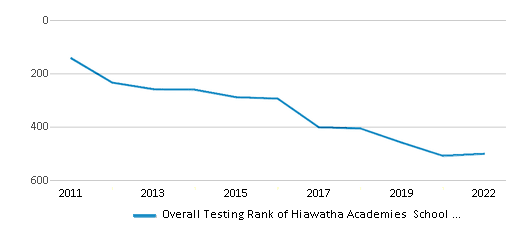
Math Test Scores (% Proficient)
11%
45%
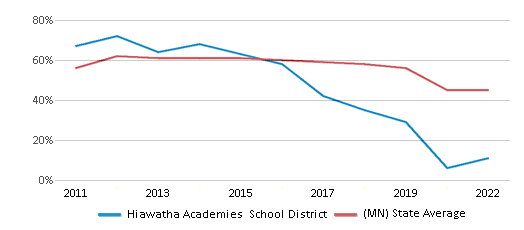
Reading/Language Arts Test Scores (% Proficient)
18%
51%
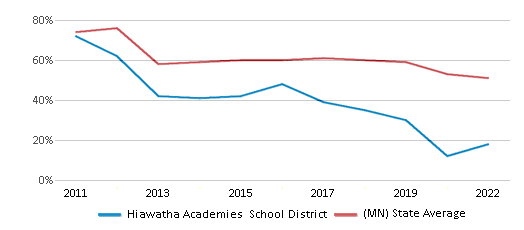
Science Test Scores (% Proficient)
7%
41%
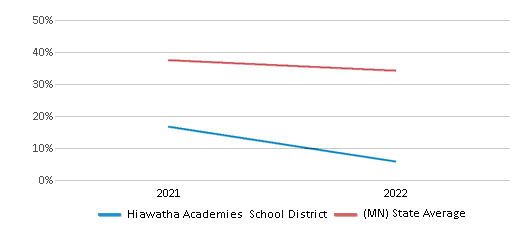
Graduation Rate
80-84%
84%
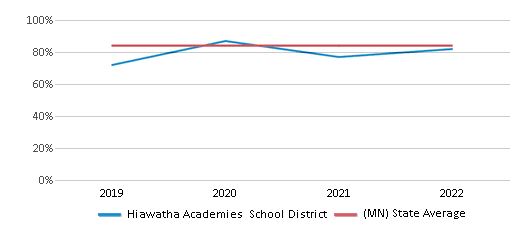
Students by Ethnicity:
Diversity Score
0.23
0.61
# American Indian Students
15 Students
10,480 Students
% American Indian Students
1%
2%
# Asian Students
1 Student
42,165 Students
% Asian Students
n/a
7%
# Hispanic Students
1,400 Students
65,127 Students
% Hispanic Students
87%
12%
# Black Students
155 Students
70,794 Students
% Black Students
10%
12%
# White Students
15 Students
344,281 Students
% White Students
1%
60%
# Hawaiian Students
n/a
676 Students
% Hawaiian Students
n/a
n/a
# Two or more races Students
19 Students
38,402 Students
% of Two or more races Students
1%
7%
Students by Grade:
# Students in PK Grade:
-
10,698
# Students in K Grade:
72
57,031
# Students in 1st Grade:
79
61,859
# Students in 2nd Grade:
80
63,560
# Students in 3rd Grade:
82
61,751
# Students in 4th Grade:
99
63,575
# Students in 5th Grade:
105
63,290
# Students in 6th Grade:
108
63,180
# Students in 7th Grade:
111
53,666
# Students in 8th Grade:
159
53,924
# Students in 9th Grade:
200
4,107
# Students in 10th Grade:
203
4,634
# Students in 11th Grade:
165
4,740
# Students in 12th Grade:
142
5,910
# Ungraded Students:
-
-
District Revenue and Spending
The revenue/student of $18,798 is higher than the state median of $17,854. The school district revenue/student has stayed relatively flat over four school years.
The school district's spending/student of $18,063 is less than the state median of $18,580. The school district spending/student has stayed relatively flat over four school years.
Total Revenue
$30 MM
$15,547 MM
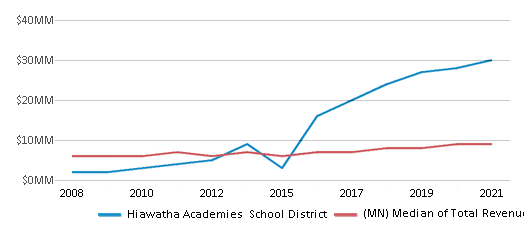
Spending
$29 MM
$16,179 MM
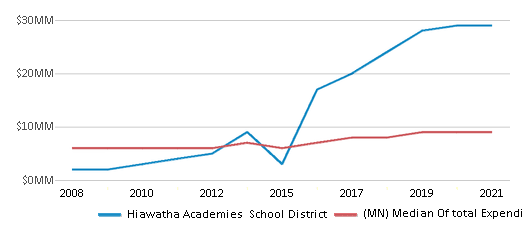
Revenue / Student
$18,798
$17,854
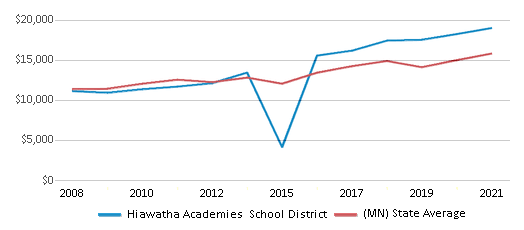
Spending / Student
$18,063
$18,580
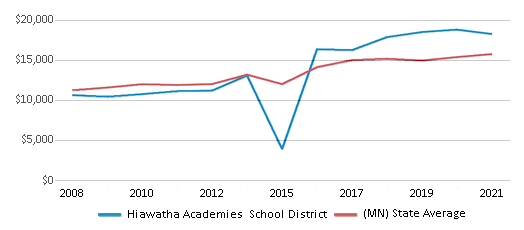
Best Hiawatha Academies School District Public Elementary Schools (2025)
School
(Math and Reading Proficiency)
(Math and Reading Proficiency)
Location
Grades
Students
Rank: #11.
Hiawatha College Prep - Northrop
Charter School
(Math: 8% | Reading: 23%)
Rank:
Rank:
1/
Bottom 50%10
4640 17th Ave S
Minneapolis, MN 55407
(612) 559-6546
Minneapolis, MN 55407
(612) 559-6546
Grades: 5-8
| 409 students
Rank: #22.
Hiawatha Leadership Acdy-northrop
Charter School
(Math: 10-14% | Reading: 6-9%)
Rank:
Rank:
1/
Bottom 50%10
1611 E 46th St
Minneapolis, MN 55407
(612) 455-4004
Minneapolis, MN 55407
(612) 455-4004
Grades: K-4
| 412 students
Recent Articles

What Is A Charter School?
Explore the world of charter schools in this comprehensive guide. Learn about their history, how they operate, and the pros and cons of this educational innovation. Discover key facts about charter schools, including admission policies, demographics, and funding, as well as what to look for when considering a charter school for your child.

10 Reasons Why High School Sports Benefit Students
Discover the 10 compelling reasons why high school sports are beneficial for students. This comprehensive article explores how athletics enhance academic performance, foster personal growth, and develop crucial life skills. From improved fitness and time management to leadership development and community representation, learn why participating in high school sports can be a game-changer for students' overall success and well-being.

February 05, 2025
Understanding the U.S. Department of Education: Structure, Impact, and EvolutionWe explore how the Department of Education shapes American education, from its cabinet-level leadership to its impact on millions of students, written for general audiences seeking clarity on this vital institution.





